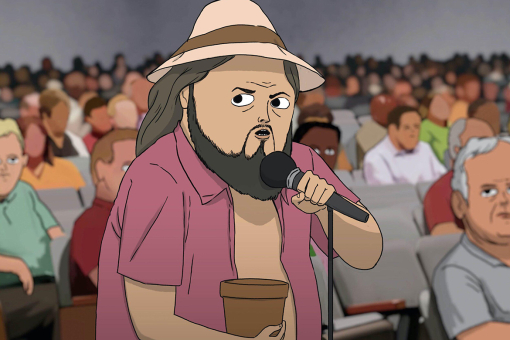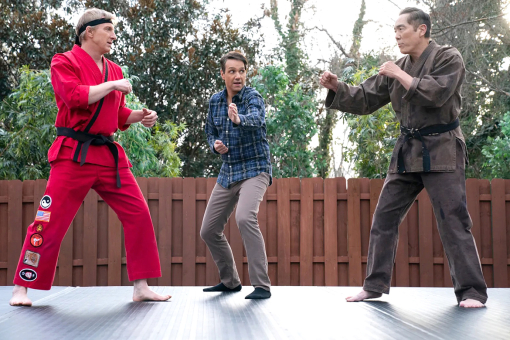In January 2014, a blizzard that raged through the East Coast dropped two feet of snow in Boston. Meanwhile, two Jewish Millennial women dropped a series on Comedy Central called Broad City.
The latter proved to have a much more sizable impact.
Over the course of five seasons, creators Ilana Glazer and Abbi Jacobson documented their devoted decade-long friendship via exaggerated, fictional versions of themselves as they navigated New York City. Known for its hilarious and spot-on portrayal of twentysomething urban angst — bed bugs! Airport travel stress! An accidental apartment lock-out! — the acclaimed series amassed a very loyal following and turned Glazer and Jacobson into comedy darlings. "I am proud to claim its timelessness," Glazer tells the Television Academy in an exclusive interview. "I think it's because Abbi and I were so true to ourselves and touched on something transcendent."
In a lead-up to emmy magazine's upcoming oral history celebrating the 10th anniversary of Broad City, Glazer and Jacobson discuss the show's origins.
Television Academy: Let's start with your friendship origin story. First impressions?
Abbi Jacobson: I met Ilana in an improv practice group that her and her brother Eliot came to one night. My first impression was, "Holy shit, the girl from Arrested Development [Alia Shawkat] is in my improv practice group!" Also: "Wow, she is unlike anyone I have ever met. I want to be around this person."
Ilana Glazer: I was 19 when I met Abbi. I knew she was a down-ass bitch. Scrappy, athletic, curious. She had a confidence about her. She knew she was an artist, and that enchanted me.
Jacobson: We had such chutzpah and hustle and drive.
Broad City began as a web series that ran from 2010 to 2011. How did you know it was catching on?
Glazer: We were absolutely obsessed with making a web series. At first, we were experimenting. And then we put it on Facebook and YouTube, and there was a snowball effect.
Jacobson: Facebook, ha!
Glazer: We got such a response from people loving it, and we got addicted to that feedback. We kept going and going and going and started to event-ize each episode. We made a production schedule and release schedule and put all our money into it.
How did Amy Poehler help the two of you get the TV series off the ground?
Glazer: We were connected to Amy Poehler through her Upright Citizens Brigade improv school. For our web series finale, we asked her if she wanted to be on it. It turned out she had seen the series. We shot it, and then we formally asked her — in an email — if she was interested in executive producing our TV show. We said, "There was a gasp across the room when you came on the screen."
Jacobson: She was our hero and still is. I feel so lucky in terms of collaborating with, like, a true comedic giant. But it's not like Amy just did it. We went after her.
Glazer: We had been writing a pilot and were trying to sell it in L.A. even before we asked her. But then, when she was in the webisode, we were like: "Let's just ask her!" and she said yes. She joined us for these pitch meetings. We were just going to go in to these executives like two knuckleheads. With her in the room, it was a totally different thing.
Was it a difficult sell? Or no, because Amy was attached?
Jacobson: It was slow-moving.
Glazer: First, we sold it to FX and developed it there for a year.
Jacobson: We thought we had a good thing. Then they passed on it.
Back when Jerry Seinfeld pitched Seinfeld, NBC executives were famously concerned that the sitcom was "too New York, too Jewish." Did you get that kind of pushback, too?
Jacobson: Well, the pass from FX was that it was "too girly." Who knows what was really going on behind the scenes there?
Did you consider making the show less "girly"?
Glazer: We did not have the self-awareness for self-identity politics. I remember after we premiered, a Wall Street Journal writer said the show was a "sneak attack on feminism." We were like, "Feminism, huh?" We had no idea. But I look back now, and we were so queer compared to other shows on TV.
Jacobson: We did talk a lot about it later, about how we were like Joey and Chandler [on Friends]. But, ultimately, this was a show based on our friendship. We weren't creating a friendship on the show. We weren't creating this dynamic. That dynamic is what made us laugh, so it made sense. That was always our jumping-off point.
Glazer: I always think it was a positive thing that FX passed. At least we got that experience.
This interview has been edited for length and clarity. Find more of our Broad City oral history in an upcoming issue of emmy magazine.











